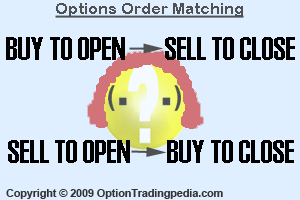What Does the Buy To Open Order Do in Options Trading?
Buy To Open (BTO) - Introduction
No other publicly traded financial instruments in the world has more types of trading orders than options. The variety of trading orders that
options trading has is one of the first things that astonished options trading beginners and also one of the first mistakes options traders
make.
Indeed, using the wrong orders would no doubt result in unnecessary losses and frustration, which makes understanding how they work extremely
important. There are four main trading orders that options traders use and they are; Buy To Open, Sell To Close, Buy To Close and Sell To Open.
When To Use Buy To Open?
Buy To Open (BTO) is the most basic trading order all
options trading beginners must know. Buy To Open is to be used when buying options, no matter
call or put options. Yes, you Buy To Open call options and Buy To Open put options as well. A lot of beginners misunderstand buying put options
as "shorting the stock" and uses the Sell To Open order instead. That is wrong. To be more technical, Buy To Open is used to establish
a long position.
The picture below explains the orders matching in options trading. As you can see, position established using the Buy To Open (BTO) orders are used to be closed with
Sell To Close.

|
|
Remember, always use the Buy To Close order when closing your naked put or call write position |
What Does Buy to Open Mean?
Buy To Open (BTO) means "Opening a position by Buying". This is exactly the same thing as buying stocks. Opening a position is to start a trading
position on a particular options contract. There are two main ways to open an options position; Going Long and going
short. Buy To Open
is opening a position by going long on a particular options contract.
When you Buy To Open an options contract, you are actually buying the options contracts from a
market maker and then keeping those options contracts in your account. This
allows you to benefit from the ownership of those options contracts including
exercising the options if you want to. To get an immediately fill, you should
use the Buy To Open order at the option's ASK price.
Buy To Open Call Options
You Would Buy To Open call options when speculating an UPWARDS move in the underlying stock through buying its call options alone. In fact, this is the exact order you will use when executing a Long Call options strategy. Buy To Open call options allows you to own those call options and benefit from its appreciation when the underlying stock goes up and also allows you to exercise the option to buy the underlying stock at the strike price anytime you want to before the call options expire.
|
Buy To Open Example :
John wants to buy the Jan40Call on the QQQQ to speculate that the QQQQ will go up. He will Buy To Open (BTO) the Jan40Calls. |
In order to take profit or stop loss on this position, you would use a Sell To Close order.
Buy To Open Put Options
You would Buy To Open put options when speculating a DOWNWARDS move in the underlying stock through buying its put options alone. This is the order you will use when executing a Long Put options strategy. Buy To Open put options allows you to own those put options and benefit from its appreciation when the underlying stock goes DOWN and also allows you to exercise the option to sell the underlying stock at the strike price anytime you want to before the put options expire.
|
Buy To Open Example :
John wants to buy the Jan40Put on the QQQQ to speculate that the QQQQ will go down. He will Buy To Open (BTO) the Jan40Puts. |
In order to take profit or stop loss on this position, you would use a Sell To Close order.
Buy To Open Questions
:: Must I always buy call options at the ask price, and sell them at the bid?
Buy To Open Videos

Buy To Open AAPL Call Options
| Javascript Tree Menu |
Important Disclaimer : Options involve risk and are not suitable for all investors. Data and information is provided for informational purposes only, and is not intended for trading purposes. Neither www.optiontradingpedia.com, mastersoequity.com nor any of its data or content providers shall be liable for any errors, omissions, or delays in the content, or for any actions taken in reliance thereon. Data is deemed accurate but is not warranted or guaranteed. optiontradinpedia.com and mastersoequity.com are not a registered broker-dealer and does not endorse or recommend the services of any brokerage company. The brokerage company you select is solely responsible for its services to you. By accessing, viewing, or using this site in any way, you agree to be bound by the above conditions and disclaimers found on this site.
Copyright Warning : All contents and information presented here in www.optiontradingpedia.com are property of www.Optiontradingpedia.com and are not to be copied, redistributed or downloaded in any ways unless in accordance with our quoting policy. We have a comprehensive system to detect plagiarism and will take legal action against any individuals, websites or companies involved. We Take Our Copyright VERY Seriously!
Site Authored by